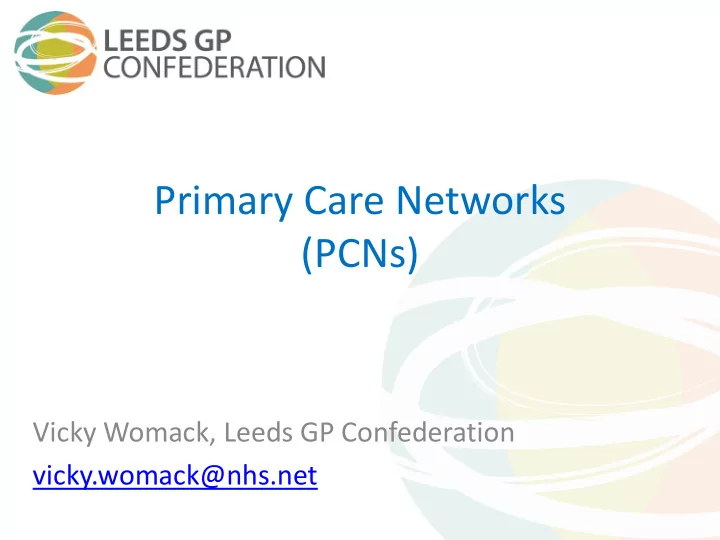

Primary Care Networks (PCNs) Vicky Womack, Leeds GP Confederation vicky.womack@nhs.net
NEW GP Contract • NHS Long Term Plan published January 2019 • New 5 year GP contract announced to outline how changes to general practice will support delivery of the NHS Long Term Plan • Biggest contract change for GP in years • New contract looks at: – Future funding to general practice – State backed indemnity scheme – More on-line technology – New ways to support GP to work at together at scale (30-50,000 population) – to be known as Primary Care Networks – Changes to QOF (core GP contract monitoring)
Why PCNs • GP Forward View / Five Year Forward View – Focus to sustain and transform general practice – General Practice remains the front door to the NHS – General Practice is under pressure due to growing demand and complexity of need – Move towards scale to provide more services in the community (footprints for delivery) – Continuing the integration journey – Putting GPs via PCNs at the centre of change and having more influence within the ICS
How will PCNs be commissioned? - PCN DES (contract to support practices to work at scale) • PCNs will be CCG commissioned • A DES is a contract used to commission GPs over and above their core PMS/GMS contract – A PCN Des will support general practice to work together on new service models to cover a population of 30-50,000 • The individual GP contract will still exist as will the registered list – this is about some new shared workforce roles, shared new income stream and taking on new national service specifications while maintaining independence of individual practices • Each PCN established by 1 st July • PCNs are currently working on Network agreements-> governance around how networks will make decisions, employ staff, manage funding • PCNs are not legal bodies
What do PCNs have to do? • Employ a Network Clinical Director ( has to be a nurse or GP) • Employ new workforce roles. PCNs will receive 70% of costs towards new workforce roles which will start in 2019. New roles are: social prescribers; pharmacists; physio’s; paramedics; physician associates • Share a Budget. A PCN with a 50,000 population will receive 1.47m by 2023/24
Cont …. • From 2020, PCNs will be expected to take on new national service specifications. These are: • Structured medicines review & optimisation = tackling over medication in priority groups • Enhanced Health in care homes =GP led, MDT delivered proactive & reactive service • Anticipatory care = proactive care to those at high risk of poor health outcomes • Personalised care = full development by 2023/24 – six main components (shared decision making; choice; support planning; self- management; personal budgets) • Early cancer diagnosis = uptake of cancer screening • From 2021/22 • CVD prevention & diagnosis = detecting undiagnosed patients • Neighbourhood Inequalities = tailored to meet specific needs
PCN & community services will be incentivised to link together • LTP – vision of care delivered at system, place & neighbourhood level • PCNs to build relationships with community partners to deliver some of the service spec’s -> move towards transformation of community services and PHM approach • Community partners to configure services to PCN boundaries • Community health services -> 4 priorities: 1. Crisis response within 2 hours/ reablement within 2 days 2. Providing anticipatory care jointly with primary care 3. Supporting primary care to develop enhanced care homes service 4. Building capacity & workforce
PCNs & LCPs To truly deliver the ambition of reducing our city’s health inequalities, it is recognised that a broader (than health and care services) perspective has to be considered; that wider determinants play a central role in maintaining individual and community health and wellbeing. In this context we need to describe and deliver on 2 fronts: Primary Care Networks (PCNs) formalising the established collaborations between local practices across geographical localities in Leeds delivering integrated community and primary care services. Through the PCNs we are developing models to deliver clinical pharmacy; MSK first contact practitioners; social prescribing; and IAPT and take on new national service specifications to address health need. Local Care Partnerships (LCPs) forming around the PCNs bringing together leaders from statutory health and care services with third sector; housing; employment; planners; elected representatives; and local people to deliver the ambition of the Leeds Health and Wellbeing Strategy and address the wider determinants of health & wellbeing.
Want to know more….. NHS England website: • PCN handbook, May 2019 • NHS Long Term Plan, Implementation Framework, June 2019
Recommend
More recommend